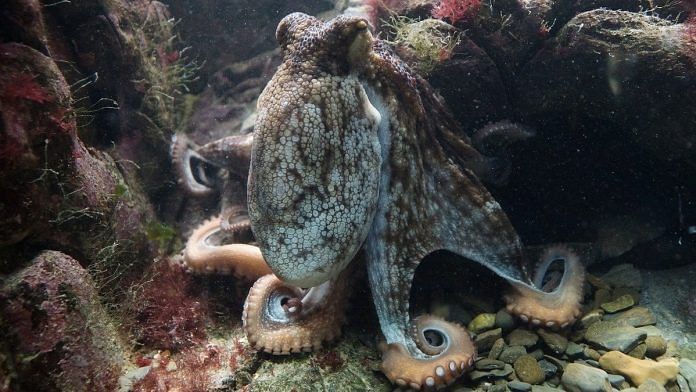Bengaluru: Octopuses can sense light with their arms even when they can’t see it, Israeli researchers have found in a serendipitous discovery while studying the causes of skin colour changes in the cephalopod due to light.
In a series of experiments, the researchers found that shining a light on an octopus’s arm caused the animal to retract it, even when it was sleeping, or when the light source was present on the other side of a small opening into which its arms could fit but the light invisible to its eyes.
Authored by Itamar Katz, Tal Shomrat, and Nir Nesher, of the Ruppin Academic Center in Israel, the study was published this month in the Journal of Experimental Biology.
Also read: Why 50% Indians will be happy to have some Neanderthal DNA. Hint: It has to do with Covid
Study findings
Previous studies have shown that octopuses exhibit a phenomenon called light-activated chromatophore expansion (LACE), which is independent of the eye. This means that when light is shone on octopus arms, they display the ability to expand chromatophores or colour-producing cells.
The Israeli researchers had set up experiments to study this phenomenon when they noticed that upon shining light on an arm of an octopus, it retracted its arm like a reflex, folding and moving away from the beam of emitted light, even when the animal was sleeping.
The scientists set up more experiments to determine how this mechanism works. This included experimental set-ups where octopuses had to stretch their arm through a small opening in an opaque, covered container for food.
When light was shone on the arm, even though the animal’s eyes couldn’t see it, the animal still withdrew its arms about 84 per cent of the time.
As conditions changed, the behaviour and response also adapted. When octopuses were kept in the dark for a week, their reflexes became stronger and faster, but the brightness of light required to activate this response increased.
Safe surgical experiments offered more insights: octopus arms stopped responding when they were either detached from the body or the animal was under anaesthesia, signalling that the brain was coordinating this response.
Additionally, when a superficial cut was made on the skin, the reflex persisted, but cuts to the muscle underneath led to its loss.
What the findings say about octopuses
Octopuses are thought to have a poor ability for proprioception or understanding of position and movement of the body.
Scientists believe these cephalopods do not always know where their free-moving arms or tentacles are. This raised questions on how they can effectively hide or camouflage when a situation arises.
The scientists now think this ability to reflexively withdraw from light is what protects these animals when hiding from predators, or hunting for prey, or safely sleeping.
However, the science behind the octopus arm response to light is still a mystery. Scientists hope future experiments can provide more insights into this highly intelligent animal’s special evolutionary adaptations.
Also read: World’s oldest DNA sequenced, belongs to million-year-old Siberian mammoth excavated in 1970s



